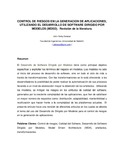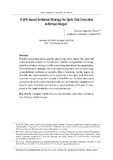ATAM-RPG: A role-playing game to teach architecture trade-off analysis method (ATAM)

Compartir este ítem
Fecha
2017Autor
Montenegro C.H.
Astudillo H.
Álvarez M.C.G.
Citación
Metadatos
Mostrar el registro completo del ítemResumen
Teaching software architecture to undergraduate students is particularly hard because they typically have no experience with medium or large systems with competing stakeholders. A particularly hard case is ATAM (Architecture Trade-off Analysis Method), which allows the evaluation of architectural designs and quality attributes by competing stakeholders. This article describes ATAM-RPG, a role-playing game to support the teaching of ATAM by simulating stakeholder's interaction and trade-offs. The initial ATAM-RPG case incorporates the architecture, scenarios and design trade-offs of the Chilean national tsunami alert system (SNAM). The approach was tested by deploying the SNAM case in undergraduate courses; initial results show that ATAM-RPG was well-evaluated regarding trade-off description and understanding (and especially utility trees). Students also recognized the importance of exercising technically-based negotiation skills. We conclude that role playing games can be fruitfully used for software architecture education. © 2017 IEEE.
Colecciones
- Indexados Scopus [1893]
Ítems relacionados
Mostrando ítems relacionados por Título, Autor o Palabra clave.
-
Control de riesgos en la generación de aplicaciones, utilizando el Desarrollo de Software Dirigido por Modelos (MDSD). Revisión de la literatura
Salazar, John Deiby (Universidad de MedellínEspecialización en Ingeniería de SoftwareFacultad de Ingenierías, 2014)El Desarrollo de Software Dirigido por Modelos tiene como principal objetivo especificar y explicitar los términos del negocio en modelos. Los modelos no solo al inicio del proceso de desarrollo de software, sino en todo ... -
Solution of A P and S wave propagation model using high performance computation
Jonathan A.; Carlos P.; Carlos V.-C.; Carlos P.The propagation of seismic waves is affected by the type of transmission media. Therefore, it is necessary to solve a differential equation system in partial derivatives allowing for identification of waves propagating ... -
Estrategia evolutiva basada en GPU para la detección del disco óptico en imágenes de retina
Sánchez-Torres, Germán; González-Calederón, Guillermo (Universidad de MedellínFacultad de IngenieríasMedellín, 2016-12-31)


